UAE climate change minister, business leaders call for greater ESG incorporation
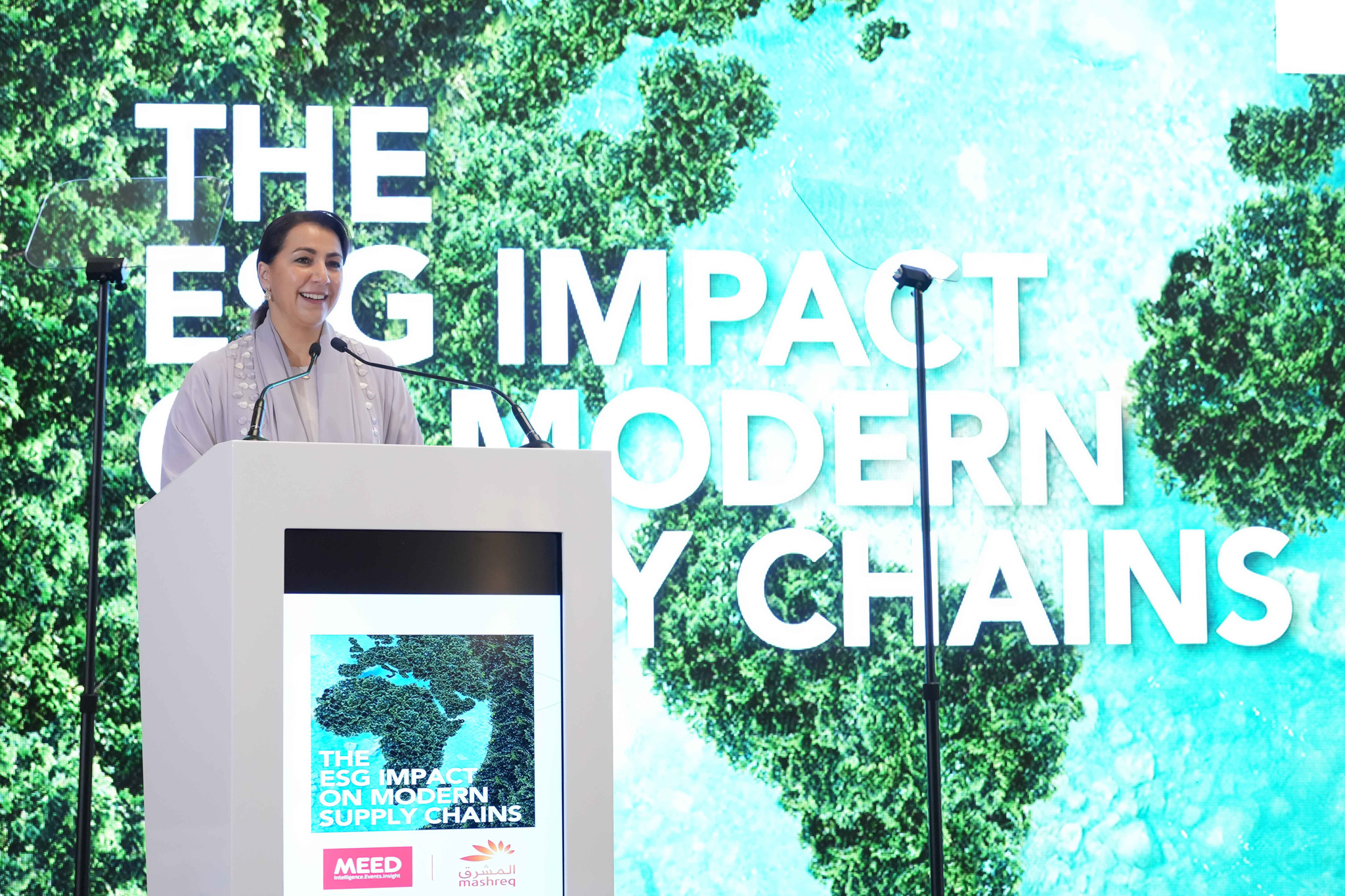
Public and private sector entities are rising to a growing demand for ESG-compliant products and services
Key takeaways:
- The inaugural MEED-Mashreq Business Leaders Forum on 31 January highlighted how ESG principles are transforming modern supply chains
- The event presented high-level insights from public and private sector entities, including the UAE Ministry of Climate Change & Environment, Global Compact Network UAE, DP World, Emirates Global Aluminium, Landmark Group, Apparel Group and GMG
- An executive panel discussion identified how industry leaders are responding to the ESG-led transition
- Individual consumers may differ in their intention and behaviour, but corporates and governments are more steadfast in their sustainability mission
- Stakeholder engagement and collaboration is crucial to ensure everyone is on board with ESG adoption
- Sectoral change needs to be driven by businesses, who in turn must introduce sustainability frameworks and also work with the government to build supportive policy and define targets
Industry experts from the UAE’s sustainability space have strongly emphasised the need for more robust supply chain practices, underpinned by environmental, social and governance (ESG) principles.
Speaking at the inaugural MEED-Mashreq Business Leaders Forum titled The ESG Impact on Modern Supply Chains, representatives from the public and private sector noted that innovation and partnerships have a crucial role to play in achieving the UAE’s national environmental targets as well as the 17 UN Sustainable Development Goals (SDGs).
“The effort needs all hands on deck,” said Mariam bint Mohammed Almheiri, Minister of Climate Change & Environment, during her opening remarks at the forum. “We need government entities, private-sector communities and individuals to all play a role in achieving the long-term goals.”
Ahead of the 28th session of the Conference of the Parties (COP28), which will convene in the UAE from 30 November to 12 December later this year, the Minister underscored the UAE’s net-zero ambitions and how these connect to the ESG principles.
“The net-zero pathway is basically a route towards growing the economy. It shouldn’t be seen as a burden, but in fact as a new way of doing business,” she said, highlighting that the ministry is now looking at tools such as incentives, regulatory changes, and the capital required to achieve the targets. The National Dialogue for Climate Ambition is a platform by the ministry, which involves regular interactions with stakeholders from various industries to build a supportive framework.
Equally important is the role of agencies in spurring businesses to adopt better ways of working. The UN Global Compact Network (UNGC) is mandated to mobilise the private sector to move from commitment to credible action across the UN’s 10 principles of responsible investment.
“UNGC is geared at providing practical tools and guidance to the private sector, to help them reach ambitious yet credible targets,” said Ibrahim al-Zubi, vice chair of the Global Compact Network UAE.
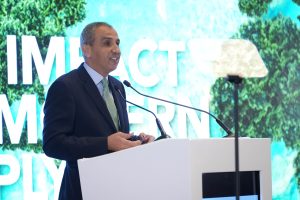
Ibrahim al-Zubi, vice chair of the Global Compact Network UAE
“This year – the UAE’s year of sustainability – will see us launch the second cohort of the Climate Change Accelerator, a six-month accelerator programme designed to equip companies of any size and scale with the knowledge and skills they need to progress towards setting emission reduction targets aligned with the 1.5-degree Celsius pathway, in line with achieving net- zero emissions by 2050.”
Adopting better practices
As the government and other entities make a stronger case for the ESG proposition, businesses and their supply chains must now take a closer look at the challenges and opportunities being presented on the route to compliance.
In his welcome note at the forum, Mashreq Group CEO Ahmed Abdelaal noted that investing in ESG “does not only make social, ethical, and environmental sense, but also economic sense”.
“On average, supply chain emissions are 11.4 times higher than operational emissions, equating to approximately 92 per cent of an organisation’s total GHG emissions. In other words, the value chain and suppliers are a tremendous opportunity for companies to reduce their carbon footprint drastically,” said Abdelaal.
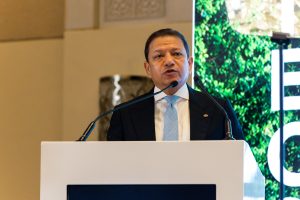
Mashreq Group CEO Ahmed Abdelaal
Companies in the UAE are already making rapid progress in line with this paradigm shift. Presenting his company’s annual sustainability report at the forum was Neeraj Teckchandani, CEO and director of UAE-based Apparel Group. As a well-known retailer and UNGC signatory, the firm has adopted a number of sustainable and socially responsible practices across its value chain, including merchandise upcycling, wastewater recycling, employing people of determination and equipping its headquarters with renewable energy sources.
“We have only just commenced on our journey of achieving a triple bottom line – profit, people and the planet,” said Teckchandani. “We still have a long way to go, and we are keen to work with the public sector and our peers in the private sector to jointly succeed on this mission.”
Meanwhile, firms such as global logistics firm DP World are strongly focusing on their ESG credentials to bulk up their financial attractiveness, in line with guidance from third-party ratings agencies.
“We are guided by something called the ‘Our World, Our Future’ strategy, which includes our internal sustainability strategy that helps us govern our operations on a day-to-day basis, as well as three legacy areas: education, women and water,” explained Ayla Bajwa, director for group sustainability at DP World. Bajwa was a part of the high-level panel discussion at the forum which discussed steps being taken by business leaders to implement ESG-led practices across their operations.
Watch the complete panel discussion here
Panellist Salman Dawood Abdulla, EVP – HSSEQ and business transformation at Emirates Global Aluminium (EGA) said that much of the demand for ‘ESG compliant products’ is coming from corporate customers.
“Our customers – from BMW to Apple – are now demanding a very transparent and digital trace of how the aluminium is being manufactured. And so, on our quest to deliver a world-class product, we must ensure it is being done responsibly.”
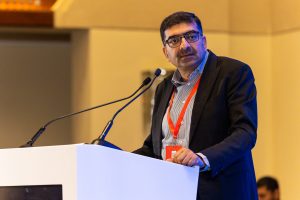
Neeraj Teckchandani, Chief Financial Officer at Apparel Group
Kapil Sethi, deputy CEO of global retailer and distributor GMG echoes a similar shift, noting that end-users – particularly from Generation Z – are driving change. “Gen-Z and millennials have the knowledge and understand very well where the product is coming from – even forgoing brands that don’t meet the sustainability criteria,” said Sethi. “This shift in the nature of demand has made us very conscious of how we deal with our suppliers, our auditing policies and processes, and collaborating with public and private entities to ensure we aligned in all of our international markets.”
At the same time, retailers observe a gap between intention and behaviour when it comes to purchasing ethically-sourced products.
“Surveys show the results we want to see – that yes, there is demand for green products. But the reality on ground is quite different and people are not willing to pay a premium for such products,” said panellist Rajesh Garg, CEO of retail firm Landmark Group. “Until that shift doesn’t happen among the end-users, either caused by regulation or a conscious mindset change, things will remain the way they are.”
DP World’s Bajwa added that while individual consumers are still differing in their intention and behaviour, corporate and government clients are embracing the shift more rapidly.
“As more organisations set their own targets and define their climate actions, they expect all of their stakeholders to do the same to avoid any liabilities. Moreover, companies are also facing a recruitment challenge, when the newer generation refuses to work for a firm that lacks a clear ESG strategy. These things are driving hard change.”
Making business sense
When asked if returns on ESG-related investments are financially justified in the current economic scenario, Garg said that “in the near-term, the opportunity for transformation by picking on the low-hanging fruits is immense”.
“I strongly believe that what is green for the planet will ultimately become green for our pockets,” said Garg. “There is a long way to go and ultimately, we will need to find other ways to improve our ESG performance. But for the foreseeable future, there is much value to be extracted by cutting out waste and being clever and creative with your product design and operations. Support from the government and financiers will only accelerate the transition further.”
“A common misconception is that ESG compliant companies are destroying value, whereas recent studies show that in fact the opposite is true,” said Joel Van Dusen, group head of corporate and investment banking at Mashreq. “There are demonstrable benefits for stakeholders, such as a reduction in risk and improvement in credit ratings – more communication is of course needed to continue to shift the narrative.”
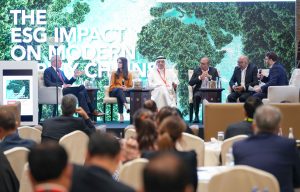
From L-R: Joel Van Dusen, Group Head of Corporate & Investment Banking Group at Mashreq; Ayla Bajwa, Head of Sustainability at DP World; Salman Dawood Abdulla, Executive Vice President, HSSEQ and Business Transformation at Emirates Global Alumnium; Kapil Sethi, Group Deputy CEO at GMG; Rajesh Garg, Group Chief Financial Officer at Landmark Group; Ed James, Head of Content & Research MEA at MEED [Moderator]
“Beyond larger corporate action, the Middle East remains relatively unfamiliar with ESG-linked financing and there is still work to be done,” said Van Dusen. “But we are very optimistic, as corporates and financial institutions across the board begin to drive change both internally and externally.”
Navigating ESG adoption across inherently complex supply chains, however, is easier said than done.
“What we need as businesses is for financiers and investors to provide the technical expertise necessary to really enable change,” said EGA’s Abdulla. “Solutions such as carbon capture are only short-term solutions. What we need is to jointly define long-term change.”
In the GCC, financiers are actively working towards defining investment parameters for sustainable projects. For example, Mashreq is designing financing structures that provide working capital to suppliers in a way that is aligned with the company’s ESG goals and rewards suppliers that display stronger green credentials.
“We must continue to challenge ourselves to be more innovative on financing. We are early on in our journey, but are embracing new ways of supporting our customers because we see the demand for it.”


